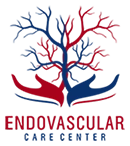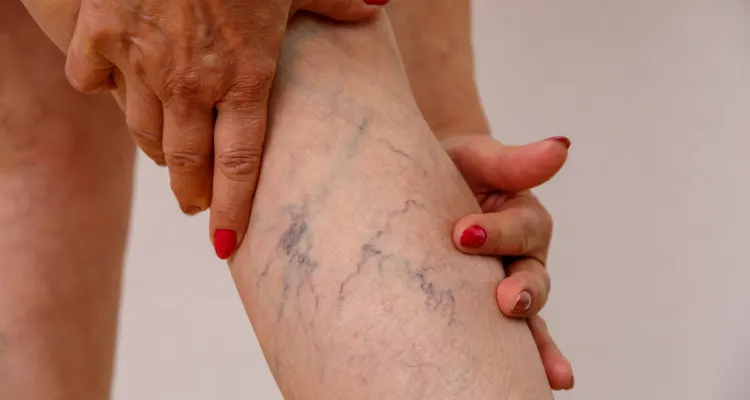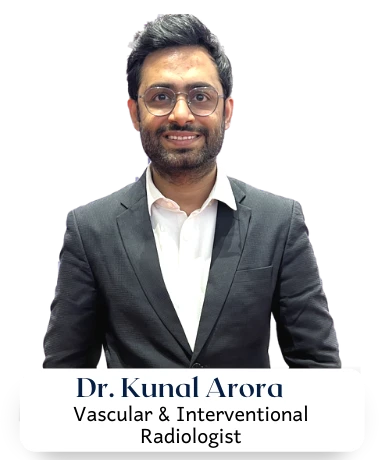What are varicose veins? Varicose veins are swollen and enlarged veins under the skin, often appearing blue or dark purple, and can be lumpy, bulging, or twisted. These veins commonly affect the legs and feet due to increased pressure from standing and walking, indicating an underlying vein disease called chronic venous insufficiency.Dr. Kunal Arora, an expert Interventional Radiologist in Mumbai, is here to provide you with top-notch care and personalized treatment for varicose veins.
Recognizing Symptoms and Risk Factors
- Symptoms of varicose veins include visible large veins, swelling, pain, throbbing, itching, and skin discoloration.
- Risk factors such as family history, age, gender, pregnancy, obesity, and lack of movement can increase your susceptibility to varicose veins.
Unveiling the Stages of Varicose Veins
- Stage One – Spider Veins: Small reddish-purple veins appear on various body parts.
- Stage Two – Varicose Veins: Swollen veins accompanied by discomfort.
- Stage Three – Edema: Swelling without skin changes.
- Stage Four – Skin Changes: Discoloration and texture changes.
- Stage Five – Skin Changes with Healed Ulceration
- Stage Six – Skin Changes with Active Ulceration
Diagnostic Approaches
To diagnose varicose veins, healthcare professionals use various diagnostic tests and procedures. These include:
- Physical Examination: Doctors visually examine the skin for irregularities and swelling, both while the person is standing and lying down.
- Duplex Ultrasound: This test uses high-frequency sound waves to create images of the veins in the legs. It helps assess blood flow, locate damaged valves, and determine the extent of truncal reflux, which is the backward flow of blood in the veins.
- Venous Doppler Ultrasound: A painless test that evaluates blood flow through the valves in the veins, helping identify any blood clots and assessing the structure of leg veins.
- Venogram: In some cases, a healthcare professional may order an angiogram, where dye is injected into the veins to provide detailed X-ray images of the blood flow through the vessels.
These diagnostic tests play a crucial role in confirming the presence of varicose veins, assessing valve function, and blood flow, and identifying any underlying issues that may be contributing to the condition.
Tailored Treatment by an Interventional Radiologist
When it comes to providing tailored treatment for varicose veins, Dr. Kunal Arora, an Interventional Radiologist, takes into account several crucial factors to ensure personalized care for each patient:
- Age: Dr. Arora considers the age of the patient when determining the most suitable treatment options for varicose veins. Age can influence the choice of procedures and the overall management plan.
- Overall Health: The general health condition and medical history of the patient are carefully assessed to identify any underlying risk factors or medical conditions that may impact the treatment approach for varicose veins.
- Severity of Symptoms: The severity of symptoms associated with varicose veins, such as pain, swelling, or ulceration, plays a significant role in determining the appropriate treatment strategy tailored to alleviate discomfort and prevent complications.
- Vein Location: The specific location of the varicose veins, whether they are superficial or deep, is taken into consideration by Dr. Arora to select the most effective treatment options that target the affected areas accurately.
- Tolerance to Treatments: Understanding the patient’s tolerance to medications, procedures, or therapies is essential in ensuring that the chosen treatment is safe and suitable for them, optimizing the overall outcome of varicose vein management.
- Expected Condition Duration: Dr. Arora considers the expected duration of varicose veins and any anticipated progression or complications when devising a treatment plan tailored to each patient’s unique needs.
- Patient Preferences: Patient opinions and preferences regarding treatment options are valued by Dr. Arora in formulating a comprehensive treatment plan that aligns with the individual’s goals and comfort level.
By meticulously evaluating these factors, Dr. Kunal Arora ensures that each patient receives personalized care that addresses their specific concerns, optimizes outcomes, and enhances their overall well-being in managing varicose veins effectively.
Varied Treatment Options
- Lifestyle Modifications: Exercise, weight management, compression stockings.
- Sclerotherapy: Injection-based treatment for smaller veins.
- Endovenous Thermal Ablation: Laser treatment for larger veins.
- Endovenous Adhesive Techniques: Glue injection to seal off veins.
- Ambulatory Phlebectomy: Surgical removal of affected veins.
- Vein Ligation and Stripping: Surgical tying off and removal of veins.
- Laser Therapy: Closure of smaller veins using laser energy.
- Foam Sclerotherapy: Foam solution for larger varicose veins.
- Microphlebectomy: Minimally invasive removal through tiny incisions.
- Combination Therapy: Tailored combination of treatments for complex cases.
For more information on Diagnosis, and Management of Varicose Veins Treatment in Mumbai, consult Dr. Kunal Arora or Contact us at +91 90040 93090.


